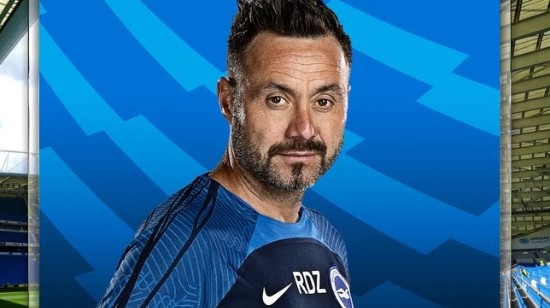The style with which Roberto De Zerbi has established Brighton in the top half of the Premier League table, this season and last, demands that the 44-year-old coach be considered for the biggest jobs. Strangely, that style also raises questions.
That is always the way when a coach has had success with fewer resources. Will that relative success be repeated when the expectation is that wins are delivered every week and results such as the recent 4-0 defeat at Luton could spark talk of a crisis?
With De Zerbi, there is an unusual twist to this familiar tale. When Sam Allardyce and Sean Dyche took unfashionable teams into the upper reaches of the Premier League, the concern was that their approach would not be ambitious enough for the very best.
In De Zerbi’s case, could it be too ambitious for cautious owners?
The good news for Brighton is that those are the whispers following reports that he is under consideration for the soon-to-be vacant role at Liverpool. Xabi Alonso has less coaching experience but it is De Zerbi whose fascinating football is seen as a risk.
In full flow, his teams find angles that others do not, triangles all over the pitch, controlling the rhythm in possession and pressing man-to-man out of it. At its very best, watching his Brighton side can feel like watching the future of the sport, evolution in action.
Pep Guardiola has called De Zerbi “one of the most influential managers in the last 20 years” because of this brand of football. The three-time Champions League-winning coach continued: “There is no team playing the way they play. It is unique.”
But can De Zerbi really be both unique and uniquely influential? Many have sought to copy Guardiola’s game, inferior versions of it abound. De Zerbi may be informing the thinking of other coaches, Mikel Arteta included, but none are seeking to replicate it entirely.
Perhaps there are parallels here with Marcelo Bielsa, the celebrated Argentine coach who has inspired so many but been overlooked for Europe’s biggest jobs. He too is regarded as a maverick who changed the way coaches think with his interpretation of the game.
De Zerbi once wrote to him when the Italian was in charge of Palermo in 2016 and was invited to observe Bielsa’s Lille team train, spending time together discussing their ideas. “If he is supposed to be crazy,” said De Zerbi, “then I would like to be the same.”
Putting this question to Bielsa in an exclusive interview in 2022, he was typically firm in his response when asked whether he saw others copying his ideas. He stuck to the facts rather than the pleasant fiction. For all the praise, no top coach chose to do it like him.
“I sincerely do not,” Bielsa told Sky Sports. “There are a lot of coaches who it has been said follow my ideas but that is not the case. I want to make it clear that those who are said to follow my ideas have clearly said themselves that this is not the case.”
De Zerbi’s own vertical approach focuses more on possession than pressing but it is similarly eye-catching when it works and alarming when it does not. Naturally, surrendering the ball in your own defensive third of the pitch is more likely to result in conceding.

